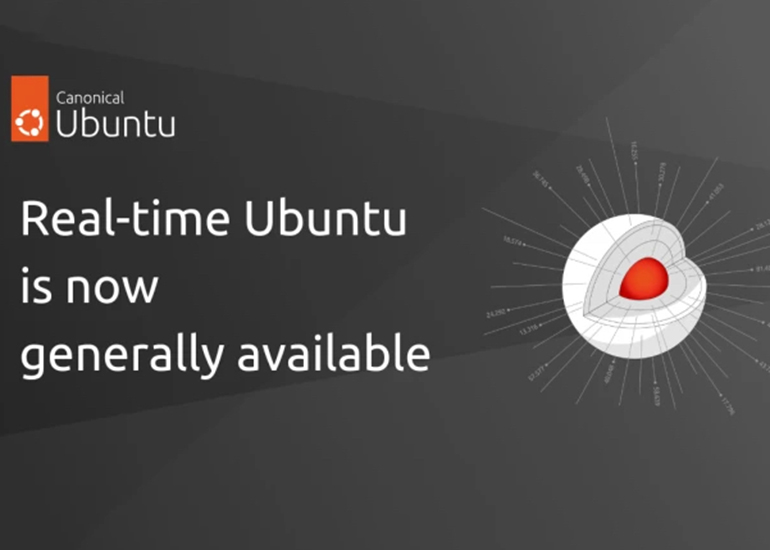|
Listen to this article
|

Canonical announced the general availability of real-time Ubuntu 22.04 LTS. Real-time Ubuntu provides a deterministic response to an external event, aiming to minimize the response time guarantee within a specified deadline. The new real-time kernel is ideal for stringent low-latency requirements. Enterprises in industrial, telecommunications, automotive, aerospace and defense, as well as public sector and retail, can now run their most demanding workloads and develop a wide range of time-sensitive applications on the open-source operating system (OS).
“The real-time Ubuntu kernel delivers industrial-grade performance and resilience for software-defined manufacturing, monitoring and operational tech”, said Mark Shuttleworth, CEO at Canonical. “Ubuntu is now the world’s best silicon-optimized AIOT platform on NVIDIA, Intel, MediaTek, and AMD-Xilinx silicon”.
Optimal compute and deterministic performance for time-sensitive applications
Based on the 5.15 version of the Linux kernel, Ubuntu 22.04 LTS integrates the out-of-tree PREEMPT_RT patches for x86 and Arm architectures. The PREEMPT_RT patchset reduces the kernel latencies as required by the most exacting workloads, helping to ensure time-predictable task execution. Meeting stringent determinism requirements and upper-bounding execution time, Ubuntu with PREEMPT_RT makes the kernel more preemptive than mainline Linux.
“The commercial availability of real-time Ubuntu on Arm demonstrates the power of open source collaboration and benefits the entire Arm ecosystem across the computing spectrum, from cloud to edge”, said Mark Hambleton, vice president of open source software, Arm. “From software-defined vehicles and smart Industrial 4.0 factories to 5G vRAN functionality and energy-efficient Arm-based hyperscale data centers, Canonical is enabling the future of computing on Arm”.
“As a global leader in AI we are focused on delivering accelerated hardware and software that power the intelligent edge”, said Justin Boitano, VP of Enterprise and Edge AI at NVIDIA. “From vision AI and 5G to robotics and autonomous vehicles, many of the solutions we develop rely on a real-time OS for ultra-low latency with end-to-end security. We are excited to see Real-time Ubuntu, an enterprise-grade, Linux operating system that will accelerate these markets”.
Ideal for telco, Industry 4.0 and automotive use cases
Real-time Ubuntu is designed to deliver performance, ultra-low latency and security for critical telco infrastructure. As workloads requiring quality of service and low latency steadily migrate to Ubuntu, Canonical designed the real-time kernel to meet telco network transformation needs for 5G.
“Canonical’s industry-leading Ubuntu Pro with a real-time kernel, provides significant value to our Service Provider and Enterprise customers across multiple industries”, said Arno Van Huyssteen, Telco Field CTO at Canonical. “We understand the importance of providing secure and reliable solutions, which is why we offer telco SLA-backed support for the real-time kernel enabled within Ubuntu Pro LTS. In-house provision of fixes, security patches, kernel module integration, and operating system platform testing can be cost-prohibitive for organizations, so leveraging Canonical’s expertise and support, ensures customers can achieve their business objectives while realizing economic benefits and investment returns from an open-source adoption strategy, without compromises”.
With support for real-time compute, Canonical is pushing the envelope of digital infrastructure and bringing the future of robotics automation forward. From industrial PCs to Human-Machine Interfaces (HMIs), a wide variety of Industry 4.0’s use cases require support for real-time Linux. As determinism is critical, industrial innovators often deploy workloads requiring a real-time OS running on their edge servers or have real-time control loops with stringent response times.
With real-time Ubuntu generally available, Canonical continues paving the way for software-defined vehicles as well, allowing for speed of development and deployment. Relying on Canonical’s state-of-the-art OTA updates and long-term security maintenance for real-time Ubuntu, OEMs and Tier 1 suppliers can shape their software-defined vehicle strategies around safe and secure open-source solutions.
“Accessing an industry-leading Linux OS on AWS, with the power of AWS Graviton processors, will help further hardware parity in automotive development”, said Stefano Marzani, Worldwide Technical Lead, Software-Defined Vehicles at AWS. “By working with Canonical, and providing access to real-time Ubuntu in the cloud, AWS is helping to empower developers to start implementing systems requiring deterministic behavior- like automotive and industrial workloads – ahead of hardware availability and in parallel with hardware provisioning”.






Tell Us What You Think!